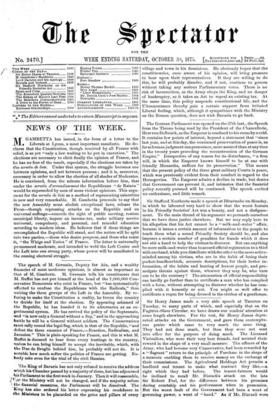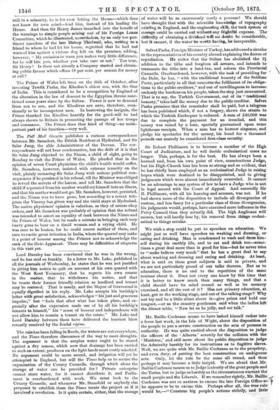Sir Henry James made a very able speech at Taunton
on Tuesday, to many parts of which, and especially that on the Fugitive-Slave Circular, we have drawn our readers' attention at some length elsewhere. For the rest, Sir Henry James depre- cated attacks on the Government, and gave them contemptu- ous praise which came to very much the same thing. They had not done much, but then they were not sent into office for the purpose of doing much. The Licensed Victuallers, who were their very best friends, had secured their reward in the shape of a very small measure. The officers of the Army, who had become very Conservative, had been rewarded by a " flagrant " return to the principle of Purchase in the shape of a measure enabling them to receive money on the exchange of their commissions. The Agricultural Holdings Act permits a landlord and tenant to make what contract they like,—a right which they had before. The tenant-farmers would be inclined to recall Mr. Disraeli's attack on the late Sir Robert Peel, for the difference between his promises during courtship and his performance when in possession. But the worst fault of the Government had been a want of governing power, a want of "hand." As if Mr. Disraeli were
still in a minority, he is for ever letting the House—which does not know its own mind—lead him, instead of his leading the Howe. And then Sir Henry James launched into the benefit of the warnings to simple people arising out of his Foreign Loans Committee, which he illustrated, nevertheless, by an only too per- tinent anecdote of the late Bishop Thirhvall, who, writing to a- friend to whom be had let his house, regretted that he had not warned him against a vicious dog left on the premises, adding, however, "My omission to warn you makes very little difference, for he will bite you, whether you take care or not." Too true, Sir Henry ! Is-there not already a-Company started and obtain- ing public favour which offers 18 per cent. per annum for money at call?



































 Previous page
Previous page